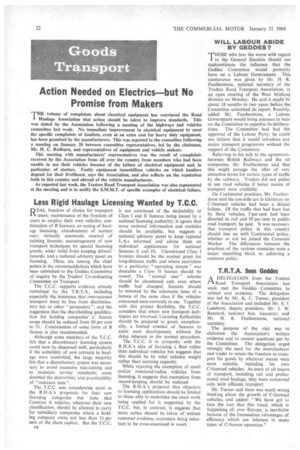Less Rigid Haulage Licensing Wanted by T.C.C.
Page 24

If you've noticed an error in this article please click here to report it so we can fix it.
EAL freedom of choice for transport users; maintenance of the freedom of users to employ their own vehicles; continuation of 13 licences; an easing of haulage licensing; abandonment of normal user; virtually automatic renewal of existing licences; encouragement of new transport techniques by special licensing grants; wider relief from keeping drivers' records; and a national advisory panel on licensing. These are among the chief points in the recommendations which have been submitted to the Geddes Committee of inquiry by the Traders' Co-ordinating Committee on Transport.
The T.C.C. supports evidence already submitted by the T.R.T.A., including especially the insistence that own-account transport must be free from discriminatory tax or other "persuaders ", and the suggestion that the shareholding qualification for holding companies' C licence scope should be reduced from 90 per cent to 51. Continuation of some form of B licence is also recommended.
Although some members of the T.C.C. felt that a discretionary licensing system could now be dispensed with, particularly if the suitability of new entrants to haulage were controlled, the large majority felt that a discretionary system was necessary to avoid excessive rate-cutting and to maintain service standards; some doubted the desirability and practicability of 'entrance tests ".
The T.C.C. sees considerable merit in the R.H.A.'s proposals for four new Licensing categories but feels that Contract A vehicles, whatever their new classification, should be allowed to carry for subsidiary companies where a holding company owns not less than 51 per cent of the share capital. But the T.C.C.
c4 is not convinced of the desirability of Class I and II licences being issued by a national licensing authority; it agrees that more national information and statistics should be available, but suggests a national advisory panel to keep regional L.A.s informed and advise them on individual applications for national licences (I and II). Unrestricted Class T licences should be the normal grant for long-distance traffic and where restriction to a particular "operating stream" was desirable a Class It licence should be issued. The "normal user" scheme should be abandoned and, even where traffic had changed, licences should be renewed by the automatic issue of a licence of the same class if the vehicles concerned were currently in use. Together with this greater flexibility, the T.C.C. considers that where new transport techniques are involved, Licensing Authorities should be prepared to grant, exceptionally, a limited number of licences to assist such development, without the delay inherent in the normal procedure.
The T.C.C. is in sympathy with the R.H.A.'s idea of licensing a fleet rather than individual vehicles but suggests that this should be by total unladen weight rather than carrying capacity.
While rejecting the exemption of small and/or restricted-radius vehicles from licensing, it suggests that exemption from record-keeping should be widened.
The R.H.A.'s proposal that objectors to licensing applications should be limited to those able to undertake the exact work being applied for is supported by the T.C.C. but, in contrast, it suggests that more notice should be taken of written customer evidence, customers being reluctant to be cross-examined in court.




















































































































